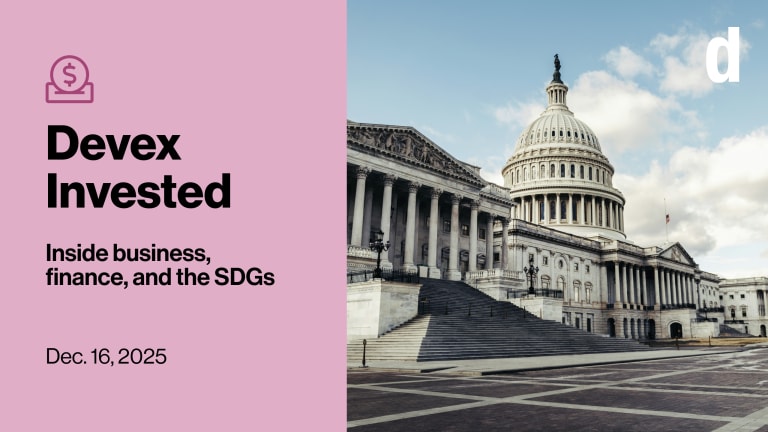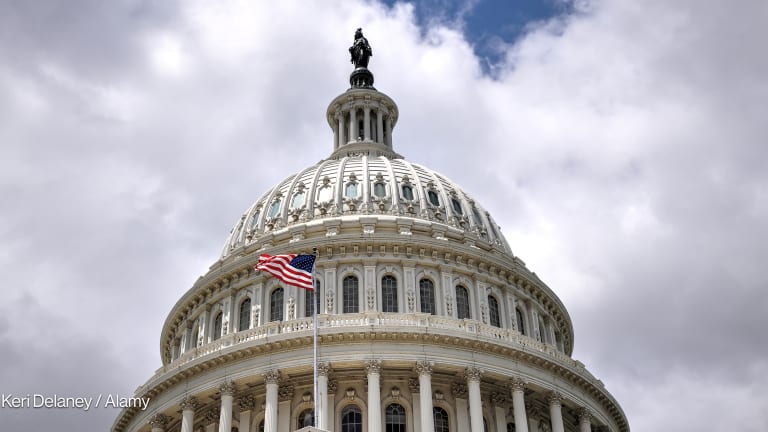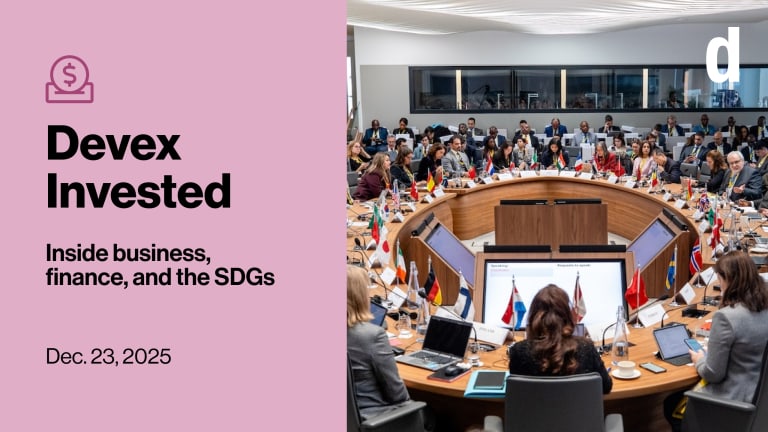
The U.S. International Development Finance Corporation is facing a forced-labor challenge with suppliers in China that caused it to forgo about $1 billion in potential solar-related investments globally in roughly the past year.
DFC paused potentially problematic projects in its solar investment pipeline as it worked to address a critical problem: Polysilicon, a key component in solar panels, is manufactured using the forced labor of the Uyghur population in China’s northwestern Xinjiang province.
Sign up for Devex Invested
The must-read weekly newsletter that keeps you up to date with news about business, finance, and the SDGs.
The agency had a series of projects and tenders related to solar that it declined to pursue, lost, or paused for so long they became irrelevant, a DFC official who was not authorized to speak on the record, told Devex.
But with a policy now in place, the agency is “open for business in solar,” and actively pursuing projects, a DFC spokesperson said.
“The solar pipeline is really important for our development agenda and our mission under the BUILD Act, at the same time we have no interest in supporting forced labor,” the official said, referencing the legislation that authorized DFC’s establishment.
While DFC didn’t support businesses accused of using forced labor directly, it has financed solar projects in the past that may have used solar panels or components from Xinjiang. With estimates of about half of the world’s polysilicon coming from the region and issues with traceability, the solar industry as a whole has been grappling with the challenge.
“The U.S. government is tackling this issue from every angle, and DFC is taking immediate actions on its projects,” the DFC spokesperson said. “This is a very difficult and troubling challenge that we are working hard on because it affects so many aspects of our important mission.”
Reports surfaced in 2021 highlighting the use of forced labor by solar companies in Xinjiang. The White House in August announced a crackdown and imposed a ban on imports of polysilicon from the region, prompting DFC to refuse financing for projects “known to be supporting forced labor,” the official said.
The Chinese government has been accused of arbitrarily detaining more than 1 million Uyghurs and other Muslim minority groups. The U.S. Department of Commerce said several companies in the solar supply chain have been “implicated in human rights violations and abuses in the implementation of the People’s Republic of China’s (PRC) campaign of repression, mass arbitrary detention, [and] forced labor.”
DFC helps expand access to electricity through the U.S. government’s Power Africa initiative, and supports the administration’s climate finance goals. It is also subject to climate directives that govern whether DFC can invest in oil and gas projects.
Todd Moss, founder and executive director of the Energy for Growth Hub, said DFC is “really getting squeezed” if it is limited in solar and can only do a few gas projects due to climate directives. Energy for Growth Hub has conducted analysis of DFC’s energy investments.
“The solar pipeline is really important for our development agenda and our mission under the BUILD Act, at the same time we have no interest in supporting forced labor.”
— Anonymous official at the U.S. International Development Finance CorporationUnder pressure
The challenge is “how to remain relevant doing solar, especially off-grid solar, to bring energy to people in need,” in a way that does not have connections to Chinese supply chains, said Rob Mosbacher Jr., former CEO at DFC’s predecessor, the Overseas Private Investment Corporation.
There are no easy answers and it will take time to ensure there is no forced labor in energy supply chains, several experts told Devex.
It cannot be fixed overnight and so realistic approaches are necessary, Mosbacher said.
DFC also faces significant pressure from the U.S. Congress, where Senator James Risch, the top Republican on the Senate Foreign Relations Committee, put a temporary hold on two solar projects DFC was pursuing. He told DFC in a November letter that he is “inclined to object to any future DFC support for solar projects involving Chinese-sourced components or equipment until DFC makes significant progress in fulfilling the following conditions.”
Risch’s conditions included DFC boosting investments in the manufacturing of solar panels, components, and equipment outside China; creating a strategy to achieve a modern slavery-free supply chain; and ensuring it has a diversified energy strategy.
Risch’s letter “served a chilling effect,” a DFC official told Devex, adding that the agency is working to get solar “back on track” and diversify supply chains.
The solution
Over the last year, DFC has rolled out a two-phased approach that goes beyond adherence to the International Finance Corporation’s performance standards on labor, the official said.
It prohibits support for borrowers or financial intermediaries who used goods from a company listed on a U.S. government sanction or Withhold Release Order, which bans importation of goods tied to forced labor. DFC is also working with other government agencies and development finance institutions to create certifications, improve traceability, and conduct auditing of the industry, the official said.
In practice, this means DFC is informing potential clients about prohibitions, banning certain suppliers, and including other requirements in its contracts.
The plan has a wrinkle, however. Since DFC’s board discussed the issue last year, Congress passed the Uyghur Forced Labor Prevention Act which specifies that anything from Xinjiang should be presumed to be produced using forced labor. So, DFC is now considering if and how to align with the lawmakers’ directive, despite the legislation not applying directly to the agency, the official said.
As it seeks to move away from projects that involve Xinjiang manufacturers, DFC is investing in new supply chains in the industry, the official said. In December, it approved up to $500 million for First Solar, the largest American solar manufacturing company, to support a new manufacturing facility in Tamil Nadu, India.
That deal is the “archetypal transaction” in this new investment vein, partly because it does not use polysilicon but cadmium telluride, the official said.
Going forward, DFC wants to ensure its policies are predictable because it currently relies on lists of banned companies that change frequently, creating uncertainty for companies seeking DFC financing, the official said.
DFC should work closely with Congress to find “common ground” on how the agency can transition away from Chinese-produced goods over time, given the market and trade-offs for energy access and other priorities, Mosbacher said.
Update, May 19, 2022: This article has been updated to clarify that the DFC paused potentially problematic projects in its solar pipeline as it put in place a new policy to address human rights challenges in solar supply chains. It is currently investing in solar projects.









